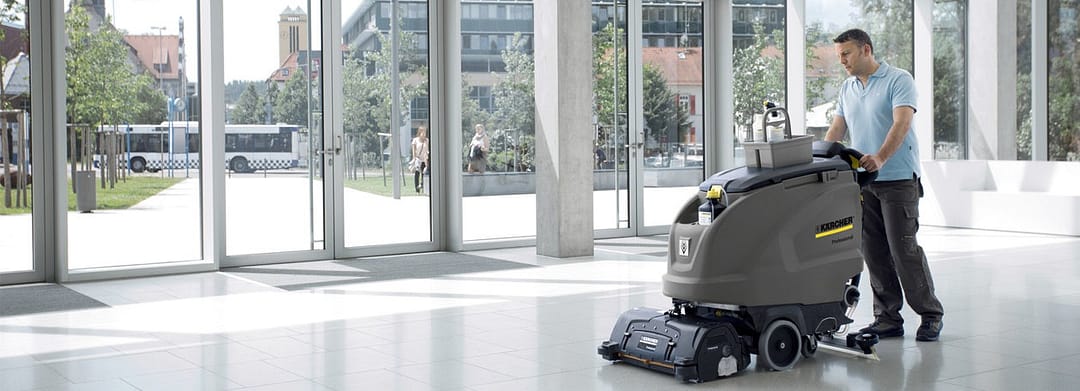Flooring is an often overlooked but vital component of a sanitation plan. Unfortunately, surfaces like carpet, vinyl, and tile can harbor grime and even pathogens. The coronavirus pandemic has made both individuals and institutions far more aware of the spread of germs—and how current health and safety practices may not be up to speed.
In light of the increasing emphasis on cleanliness, we expect to see a sizable bump in the number of concrete floor coating and polishing projects out there. We’ve put together some valuable information on the sanitation benefits of both polished concrete floors and concrete floor coatings to share with your customers—as well as some tips for properly cleaning these surfaces.
Sanitation Benefits of Polished and Coated Concrete
Floors see quite a bit of activity, from foot traffic to vehicle and heavy equipment movement. That makes it easy for dust, dirt, mildew, and even bacteria to accumulate, raising some serious safety concerns. Luckily, coated or polished concrete floors offer an excellent solution for easily managing sanitation needs. Right off the bat, hard, flat surfaces are far less likely to get dirty and house germs.
It’s true that untreated concrete is highly porous, but this material can be transformed with the help of sealing, coating, and polishing. Because they lack pores and other voids, coated or polished concrete floors don’t trap much of the filth that causes safety concerns and requires extensive cleaning.
Just a glance at the sanitation benefits of these flooring choices should show you why contractors are landing more projects in universities, restaurants, and even corporate offices:
- Because polished or coated concrete has no tile joints, large pores, or other spaces for contaminants to get trapped in, it doesn’t hold onto things like dust, dander, and dirt.
- Additionally, these floors don’t house bacteria or other microorganisms.
- Polished concrete floors and most concrete coatings also won’t allow for mold growth, making them an excellent choice for areas that are frequently subjected to moisture.
- Lastly, both types of floors are easy to clean and sanitize.
How Do You Clean Polished Concrete?
We said polished concrete floors are easy to clean—but you’ll still need the correct tools and a regular maintenance schedule to ensure the integrity and longevity of an installation. Damage done to a polished concrete floor, whether as the result of poor maintenance or an accident, can compromise its sanitary nature, so be sure to investigate and address any signs of harm quickly.
As for a cleaning schedule, daily cleaning is a necessity. Even if the space doesn’t see traffic every day, dust and dirt will still accumulate and can act as an abrasive to a polished concrete floor. A quick daily sweep or dust mop with a microfiber cloth will keep these loose particles from damaging and dirtying your floor.
Beyond your daily dry mop, we recommend wet mopping at minimum once per week with a neutral-pH cleaner like the RSP Revive Floor Cleaner. This will allow you to remove built-up grime and tackle any heavily-soiled areas. If you’re working with a particularly large flooring installation, a mop probably isn’t enough to get the job done in a timely fashion. Just break out an auto scrubber with non-abrasive brushes and pads, and you’ll be ready to tackle that floor quickly and efficiently.
How Should You Clean Coated Concrete?
Unlike polished concrete floors, concrete coatings mechanically bond to the surface of the concrete on top of the surface to form a protective barrier against anything that could damage the flooring, like equipment traffic or spills. There are a variety of different coatings out there, each with their own benefits, so the correct cleaning procedure for a floor will depend on the type of coating you’re dealing with.
Cleaning floors with a resin-based coating is similar to cleaning polished concrete—we recommend dry mopping daily and using a neutral-pH cleaner. When it comes to sanitation, keep in mind that these floors can be damaged by phenol (a common component in many disinfectants).
Acrylic coatings, on the other hand, can be harmed by organic solvents, alcohol, and concentrated hydrogen peroxide, just to name a few. For safe sanitation, choose a cleaner with a hydrogen superoxide, formaldehyde, or hypochlorite base. An auto scrubber with rotating brushes can be used to clean large floors.
Tackle Any Job with Runyon Surface Prep
Whether you’re flooded with projects or are taking time to grow your technical skills and expand your service offerings, you can benefit from a knowledgeable, well-supplied partner for all things surface preparation and concrete flooring. Runyon Surface Prep is a full-service sales and rental facility that has been serving contractors across the country for decades. We’re passionate about the work we do and the relationships we establish—meaning that we’re perfectly positioned to support you in projects big and small. Reach out today to learn more about how we can meet your needs.
